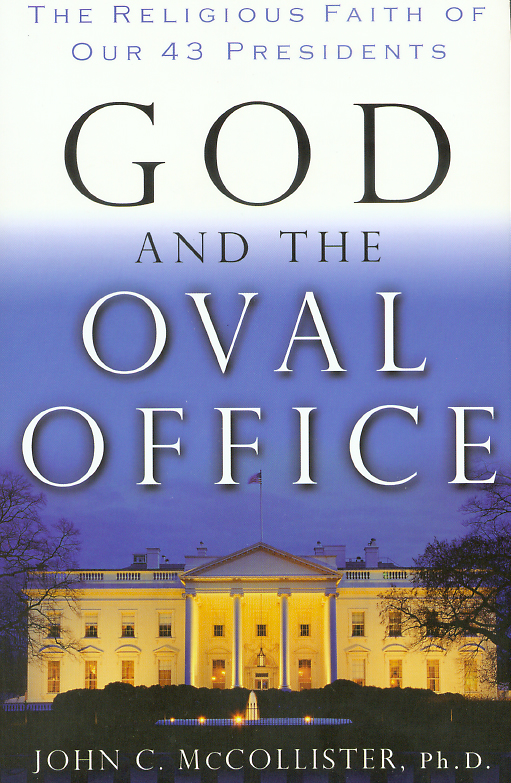
NASHVILLE, Tenn. (BP)–Andrew Jackson, America’s seventh president, never has been remembered as a pleasant fellow. He had a severe temper. He once killed a man in a duel. He supported the removal of American Indians from the South, sparking the infamous Trail of Tears.
Yet this gruff man may also have been a Christian. Nearing death in 1845, he reportedly told his family, “Death has no terror for me…. What are my sufferings compared to those of the blessed Savior? I am ready to depart when called.” Later, he told them: “Be good children, and we shall all meet in heaven.”
Such stories are at the heart of a new book, “God and the Oval Office” (W Publishing Group), by John C. McCollister. At 244 pages, it recounts the religious faith of all 43 American presidents, from George Washington to George W. Bush.
The book does not argue that every president — including the Founding Fathers — was an evangelical Christian, but it makes clear that the overwhelming majority of presidents expressed a faith in God.
“The book does not make judgmental statements,” McCollister told Baptist Press. “It simply says, these are the facts. You draw your own conclusion.”
Some of the book’s more interesting stories:
— Thomas Jefferson rejected the major tenets of Christianity — including Christ’s deity — and even put together his own compilation of the Gospels, in which he cut out the stories about Jesus’ miracles. But Jefferson also saw the need for religion in society, and once was on his way to church when he told a bystander: “[N]o nation has yet existed or been governed without religion. I, as chief magistrate of this nation, am bound to give it the sanction of my example.”
— John Quincy Adams, the nation’s sixth president, read at least three chapters of the Bible each day, and “lamented the fact that neither the clergymen nor their flocks did much to rid society” of slavery. When he died one pastor said, “The slave has lost a champion.”
— James Buchanan, the 15th president, wanted to join a church upon leaving office but had trouble doing so because of his support of slavery on a limited basis. His first attempt at joining a Presbyterian Church was rejected because it supported abolition. It took him nearly four years to find a church.
— Abraham Lincoln, who succeeded Buchanan, often stood at his pew in church while silently praying — despite the fact that those around him kneeled. With Lincoln being 6-foot-4, this created quite a sight. He told a parishioner: “When my generals visit the White House, they stand when their commander in chief enters the Oval Office. Isn’t it proper, then, that I stand for my commander in chief?”
There are other stories. James K. Polk (11th president) didn’t receive visitors on Sunday, out of respect for his wife’s beliefs. Andrew Johnson (17th president) may have been a closet Catholic. Woodrow Wilson (28th president) saw every event in world history as being part of God’s will.
“Nobody will ever be elected to the presidency of the United States who does not show a strong faith in Almighty God,” McCollister told BP. “… There’s not going to be any president elected who is an agnostic or refuses to acknowledge that he depends on God.”
Americans, McCollister said, want “to make certain that our leader reflects the theme of the Founding Fathers.”
McCollister believes that three of America’s first four presidents, George Washington, Jefferson and James Madison, were deists — that is, that God created the universe and left it to run its own course. In deism, God is distant. Although Jefferson generally is acknowledged by scholars to have been a deist, Washington is viewed by some to have been a Christian.
“They were deists by their own admission,” McCollister said. “But all of these Founding Fathers had two themes — number one, that they believed in the almighty power of God, and number two — that America would survive as a nation only if it recognized and depended upon the power of Almighty God.”
Studying the beliefs of America’s first few presidents, McCollister said, can help in the contemporary debate over the separation of church and state. Americans should embrace a separation of church and state that says no “particular denomination” can “rule the United States at the expense of others,” he said.
“But while we have separation of church and state in that regard, we dare never, ever lose light of the fact that we were founded on belief in Almighty God, and that the power of Almighty God and the benevolence of God is the reason that America has survived and will survive,” he said.
The current occupant of the Oval Office is the most outspoken Christian president America has ever had, McCollister said.
“George W. Bush says that God speaks to him, and he speaks to God, and that God has a special mission for America,” he said. “He is probably the most outspoken person for the faith that we have had. Ronald Reagan comes in a close second, Jimmy Carter maybe a third. Teddy Roosevelt a fourth.”
McCollister majored in history at Capital University before receiving a master’s degree at Trinity Lutheran Seminary. He has a Ph.D. in communications from Michigan State University. “God and the Oval Office” is his 21st book. Many of his other books have been about baseball.
He decided to write about the presidents after having “never seen a book on something that is becoming increasingly important — namely a president’s faith.”
–30–
“God and the Oval Office” is available online at www.LifeWayStores.com

















